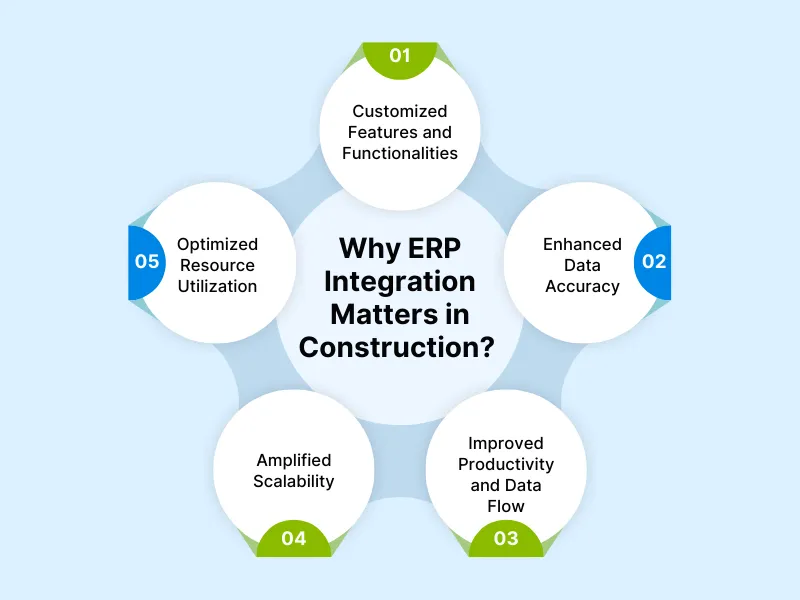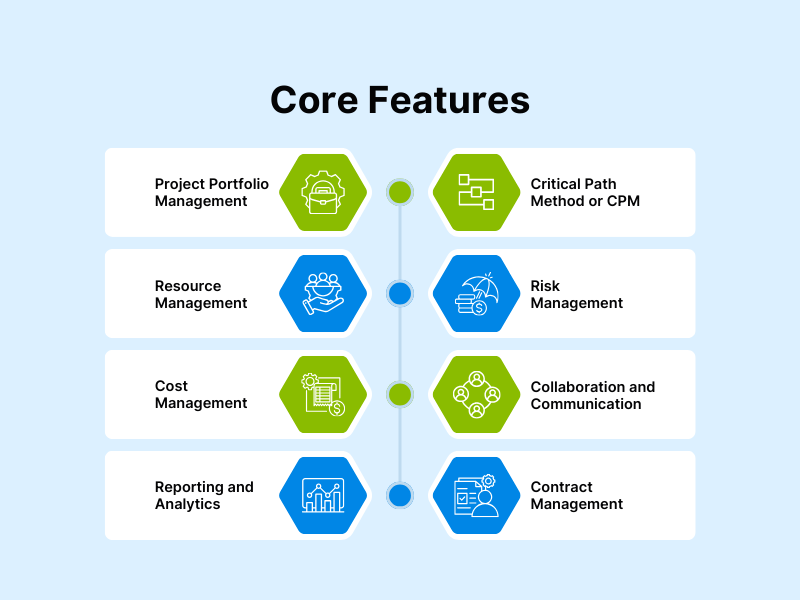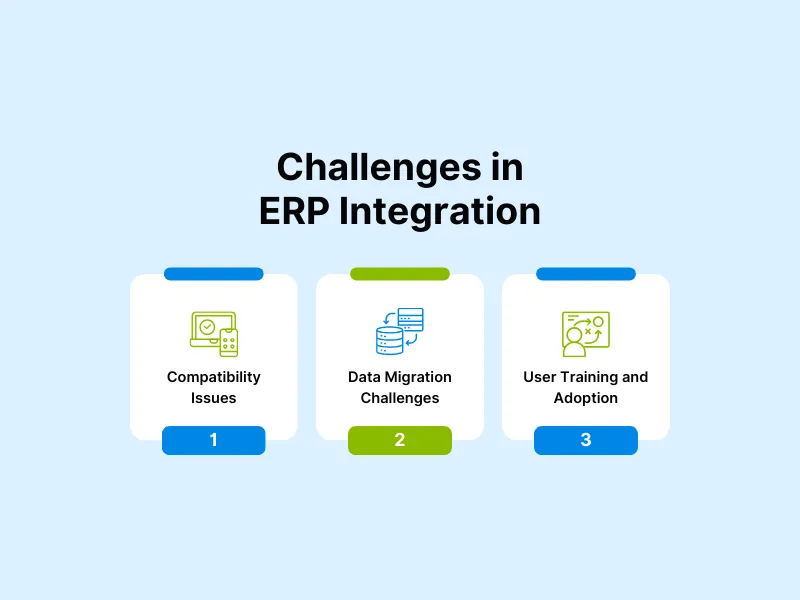Integrating ERP Software With Custom Solutions to Optimize Construction Management
ERP or Enterprise Resource Planning Software is a comprehensive business management system that integrates different processes into a unified platform to boost organizational productivity and enhance decision-making.
ERP in construction management plays a pivotal role by streamlining operations, improving collaboration, and ensuring real-time data access across all project stages.

Introduction
Effective management solutions have also allowed construction businesses to tackle unprecedented challenges like project complexity, rising costs, and labor shortages without disrupting workflow to ensure projects are completed on time, within budget, and to the desired quality standards.
Nowadays, companies involved in the construction business, real estate professionals, project managers, contractors, civil engineers, and building architects are using innovative digital tools or construction management software to streamline project planning, improve coordination, and gain better control over building projects from start to finish.
The software aligns with project management and business information modeling (BIM) tools to provide real-time insights into project progress, resource allocation, and potential risks. It also uses advanced technology for efficient budget allocation and enhances collaboration among stakeholders, ensuring that everyone is aligned and informed, thereby reducing the likelihood of errors and rework.
Here, in this article, our experts will highlight how ERP systems along with custom solutions are revolutionizing and optimizing the construction industry.
Introducing ERP Software For Construction Industry
Enterprise resource planning systems are business automation tools that automate and streamline various processes by collecting and managing key information in a centralized database to improve efficiency, increase collaboration, minimize operational costs, and provide real-time insights to make informed decisions.
ERP in construction is a comprehensive and tailor-made solution that allows construction companies to manage their operations efficiently, including project planning, task scheduling, material procurement, accounting, and inventory control.
A Brief Overview of ERP Software’s Role in the Construction Sector
Enterprise resource planning platform serves as a centralized hub of information for the construction industry, enabling every stakeholder to view up-to-date data insights related to suppliers, laborers, raw material availability, estimated time of project completion, and allocation of resources to different tasks. ERP systems handle complex projects efficiently, minimizing errors and delays.
We have briefly highlighted the role below
- Streamlined Operations: Integrates various business functions into a single platform, reducing redundancies and minimizing errors.
- Improved Collaboration: Enhances communication among stakeholders, including contractors, suppliers, and clients, by providing a centralized database for real-time information access.
- Enhanced Decision-Making: Offers real-time data and analytics, enabling construction managers to make informed decisions regarding project progress, financial health, and resource utilization.
- Resource Management: Facilitates efficient resource allocation, ensuring that materials, labor, and equipment are used optimally throughout the project lifecycle.
- Financial Management: Tracks project costs, budgets, and financial performance, helping to control expenses and improve profitability.
- Procurement and Supply Chain Management: Streamlines procurement processes, from ordering to delivery, ensuring timely availability of materials and services.
- Compliance and Reporting: Assists in meeting regulatory requirements and generating necessary reports for compliance and performance monitoring.
- Risk Management: Identifies potential risks early on and provides tools for mitigating them, enhancing project safety and reducing delays.
Importance of Integrating ERP for Construction With Custom Solutions

Integrating custom solutions with ERP software for construction allows real estate and construction companies to leverage a plethora of benefits. These include
- Customized Features and Functionalities - Software companies integrate ERP systems with custom solutions to build specific features and functionalities for construction management to ensure seamless workflows and unique project requirements. These may include advanced project tracking, bespoke reporting tools, and tailored compliance modules.
- Enhanced Data Accuracy - Integrating the two efficient systems helps construction companies minimize manual intervention, streamline processes, and improve data accuracy.
- Improved Productivity and Data Flow - The ERP system for construction helps to automate tasks and optimize operations to improve overall labor productivity, whereas integration also fosters better communication and data sharing among all departments, ensuring all stakeholders have access to up-to-date information.
- Amplified Scalability - Integrating ERP and custom software allows construction firms to become more scalable and flexible, quickly adapting to evolving project demands and market conditions.
- Optimized Resource Utilization - ERP for construction industry increases and optimizes resource utilization and management, letting firms make informed decisions and leading to overall project success.
Enhance Construction Operational Efficiency and Resource Optimization With ERP Solutions
Foster Better Data Flow and Communication Across Departments
ERP Software For Construction Industry: The Prominent Names
It’s now time for us to look at some of the prominent and major Enterprise Resource Planning players that are helping construction companies modernize their processes and become future-ready by integrating tailored features and technological advancements.
The first in this list is SAP S/4HANA.
SAP S/4HANA helps the construction industry by providing a robust, integrated platform that enhances project management, financial control, and resource optimization.
Customized S/4HANA Features Optimizing Project Planning and Management and Streamlining Financial Operations
- Project Planning - Construction companies can use SAP S/4HANA ERP software for construction to craft tailored and detailed project plans and roadmaps, and make informed decisions.
- Real-Time Project Monitoring - SAP ERP for construction offers real-time insights into project progress, enabling proactive management and adjustments. It helps to mitigate bottlenecks and risks.
- Collaboration Tool - Serves as a viable communication and collaboration tool, facilitating seamless communication among all stakeholders and teams, including smooth data and document sharing.
- Resource Allocation and Management - Provides instant insights into resource availability and utilization, avoiding rework and waste, and supports lean construction principles.
- Reporting and Analytics - Offers real-time dashboards, predictive analytics, and visualizations to make informed decisions for project optimization.
Financial Management
- Budgeting and Forecasting: Helps create accurate budgets and forecasts, ensuring financial control and stability.
- Cost Tracking: Monitors and tracks project costs in real-time, preventing cost overruns and ensuring profitability.
- Financial Reporting: Generates detailed financial reports, enhancing transparency and aiding in compliance.
- Integration with Procurement: Streamlines procurement processes, linking financial management with supply chain activities.
Integration Capabilities With Custom Software Solutions
SAP S/4HANA boasts robust integration capabilities with custom software solutions, enabling construction companies to tailor their technology stack to specific business needs. This integration ensures seamless data flow between SAP S/4HANA and specialized applications, allowing real-time data synchronization, and enhancing operational efficiency.
SAP’s integration with advanced technologies like machine learning, artificial intelligence, and predictive analytics transforms construction techniques and makes the supply chain and procurement process more efficient, agile, and intelligent.
Moreover, SAP S/4HANA’s open architecture and APIs facilitate easy connectivity with third-party applications, allowing construction firms to leverage existing software investments.
Oracle Construction and Engineering (Primavera)
The next on this list is Oracle Construction and Engineering or Oracle Primavera, which is a project portfolio management software that is primarily used by construction companies, manufacturing organizations, the energy sector, and many more industries.
Oracle ERP software solutions for construction allow companies to synchronize tasks across planning, enhance collaboration between project teams, and empower decision-makers.
The Core Features of Oracle Primavera Project Portfolio Management Software

- Project Portfolio Management - Primavera uses the Enterprise Project Structure tool to efficiently manage multiple projects in a program or portfolio. It also offers advanced Gantt charts and intuitive dashboards for comprehensive project planning, scheduling, and tracking of key project metrics.
- Critical Path Method or CPM - Critical Path Method or CRM is a critical Primavera solution that provides advanced scheduling capabilities and allows construction workers to find the crucial path of their project. The project scheduling system lets managers estimate the total duration of the project and decide the priority of the tasks that need to be completed first.
- Resource Management - One of the critical features of Primavera P6 is an effective and detailed resource allocation and tracking of labor, equipment, and materials. The best ERP software for construction industry also provides capacity planning to match resources with project demands, and resource optimization.
- Risk Management - Primavera’s risk management feature allows construction managers to track, identify, and mitigate potential risks before they become core issues. They use scenario analysis to evaluate potential impacts and the ERP platform also offers risk-reporting abilities for proactive management.
- Cost Management - With Oracle Primavera, users can plan and forecast budgets accurately to track project costs. It also helps to handle cost control measures, eliminate financial risks, and manage expenses. Primavera also offers earned value management (EVM) for performance measurement.
- Collaboration and Communication - Oracle Primavera enables construction companies to store all crucial data in a centralized repository, ensuring all stakeholders have access to the latest information. The software provides advanced team collaboration tools, including forums, chats, and discussion boards. Document management feature allows sharing and storing project-related files, while integration facilitates connection with email, messaging, and other communication tools.
- Reporting and Analytics - Generate real-time and customizable reports for project performance insights. Access instant KPIs to track progress, identify issues, and use historical data, including software development metrics for trend identification and future project planning.
- Contract Management - This feature helps to track contract terms, conditions, and compliance. Construction firms can also change work orders to adjust project scope and handle payment and invoicing accurately.
Primavera Customization Options and Integration Possibilities
Construction companies can easily customize Primavera’s project portfolio management and scheduling capabilities to meet their unique needs, optimize workflows, and streamline operations. The different customization options include
- User-Defined Fields (UDFs) - Create custom fields to capture project-specific data and tailored data elements to identify data representing unique project aspects. Also, you can design personalized dashboards to display important KPIs and generate customized reports based on the requirements.
- Workflow Templates and Forms - Design tailored workflows to automate business processes, while customized templates and forms help standardize project initiation and planning.
- Activity Codes and Calendars - Customize activity codes to categorize tasks and activities for better organization. You can streamline task allocation and adjust layouts, views, and menus to suit individual or team preferences.
- Permission and Roles - The option lets you define custom roles and permissions to control access to project information. It also allows you to ensure that users have appropriate access based on their responsibilities
Oracle Primavera ERP System for Construction provides two methods of integration. First is the Direct Integration Method and the Second is integration using Primavera Gateway.
If we talk about the integration possibilities, these include
- The integration of APIs and web services
- Aligning systems with Oracle Ecosystem and various Business suites like Oracle ERP
- Third-party ERP software integration, such as SAP ERP, Microsoft Dynamics 365
- Integration With BIM tools for enhanced construction project collaboration
- Integration with collaboration systems like Microsoft Team, Slack
- Integrate Oracle Primavera With Mobile Applications
Procore
Procore is a leading cloud-based construction management software company that enables construction companies to collaborate seamlessly and share documents and data quickly using an Internet-connected device.
This ERP system software powers the construction industry by providing an innovative construction project management tool that smoothly connects teams and gathers real-time project information to drive improved decisions.
Additionally, teams can also access everyday task schedules and receive updated information on project status in an easily understandable format. The software allows the teams to identify potential loopholes and their significant impact on project deliverables and budget.
Procore also focuses on field productivity. Here it’s ERP for construction firms plays a handy role in reducing labor budgets and scheduling tasks with accurate decision-making, powered by real-time data insights.
The software’s construction time & materials (T&M) solution helps construction companies capture, document, verify, initiate a change, and get paid for out-of-scope work. It increases field-to-office visibility, eliminates payment disputes, and ensures quick payment to save time.
Keep your field teams productive by tracking the quantity of materials installed and increase profitability by at-risk scope of work.
API Availability For Integration With Custom Solutions
Procore provides open API to seamlessly integrate your ERP software for construction with custom solutions. The API supports operations such as project management, document control, and financial management, allowing for seamless data exchange between Procore and other software systems.
Construction companies require an API key, and Procore provides comprehensive documentation and support to guide the integration process.
Viewpoint Vista
Viewpoint Vista stands out as a premier ERP solution designed with the construction industry in mind. This comprehensive software offers a wide array of modules that cover essential areas such as accounting, project management, and operations.
By integrating these functionalities into a single platform, the software helps streamline various aspects of construction management, ensuring that projects run smoothly and efficiently.
In the realm of accounting, Viewpoint Vista simplifies financial management with robust tools for budgeting, forecasting, and expense tracking. This integration helps construction firms maintain accurate financial records and manage cash flow effectively.
For project management, the platform provides features that facilitate real-time tracking of project progress, resource allocation, and risk management, enabling teams to stay on top of project milestones and deliverables.
The ERP for the construction industry is further enhanced by Viewpoint Vista’s focus on tailored solutions. These solutions address specific construction needs, such as compliance and procurement, ensuring that the platform can adapt to the unique demands of the sector.
Tailored Solutions for the Construction Industry
Viewpoint Vista supports Custom Software Development Services, allowing businesses to customize the system according to their unique requirements. This flexibility means that companies can develop bespoke solutions to tackle their specific operational challenges, maximizing the efficiency and effectiveness of their ERP investment.
BuilderTREND
BuilderTREND is a leading all-in-one project management software designed to streamline construction project workflows. It offers a comprehensive suite of features, including scheduling, budgeting, and client management, all within a single platform.
- This integration helps construction professionals manage their projects more effectively, ensuring that every task is completed on time and within budget.
- The scheduling feature allows users to create and manage project timelines with ease, ensuring that all tasks are aligned and deadlines are met.
- Budgeting tools provide a clear overview of financials, helping teams track expenses and manage costs efficiently.
- Additionally, BuilderTREND’s client management capabilities enhance communication and collaboration, keeping clients informed and engaged throughout the project lifecycle.
Integration Options for Custom Solutions and Workflows
BuilderTREND also offers robust integration options for custom applications and workflows. This flexibility enables construction businesses to connect the software with other tools and systems they use, tailoring the platform to meet their specific needs.
Whether integrating with accounting software, CRM systems, or custom-built applications, the tool’s adaptability ensures that construction firms can streamline their operations and enhance their project management capabilities.
By combining powerful project management features with customizable integration options, it supports construction managers in optimizing their processes and achieving project.
Integrate Construction Management Software Based on Business Needs
Get Comprehensive Support and Assistance in ERP Integration
Challenges in ERP Integration

So far we have thoroughly discussed and highlighted all the prominent players and major construction management software vendors that work towards a common goal - Simplifying the Construction Processes and Automating the Workflows With Strategy Building to Minimize Construction Costs.
We also discussed how each of these ERP software for construction integrates with custom solutions. Now, we will highlight the core challenges that software developers face while integrating ERP systems with other applications.
- Compatibility Issues - Here the challenge is to integrate new ERP platforms with existing legacy software, which may lead to data silos and inefficient and outdated processes. Updated editions do not mix and match well with older versions.
- Data Migration Challenges - Construction companies often face problems when they are migrating their existing data from one ERP system to another. The main challenge is to ensure accurate and complete data transition without disruption. They can hire software developers who are experts in migration for validating and cleaning data to prevent discrepancies and disruptions in operations.
- User Training and Adoption - Another crucial challenge that grips ERP for construction is inadequate employee training and their minimal understanding of new ERP workflows and system functionalities. Software companies must provide comprehensive training programs and ongoing support is essential for a smooth transition and maximizing ERP benefits.
Custom Software Solutions for ERP Integration
Custom software solutions help to transform and modernize legacy ERP systems into powerful tailored tools that perfectly align with your business needs.
So, What Role Does Custom Software Development Play?
Custom development is crucial in adapting ERP systems to the distinctive needs of a business. It allows businesses to tailor ERP modules to their precise needs. This means modifying existing modules or creating entirely new ones to support specialized functions, such as unique inventory management processes or bespoke reporting needs.
Custom solutions ensure that each module integrates seamlessly with existing workflows, enhancing overall productivity. For instance, construction companies can bespoke modules to automate complex supply chain logistics.
It also assists in enhancing ERP functionality through the development of extensions and add-ons. Construction firms can easily expand their system capabilities and incorporate new features quickly.
Role of Integration Architecture
Effective integration architecture is crucial for seamless data flow between ERP and custom applications., while API integration ensures smooth integration between ERP systems and external applications, leading to software functionality enhancement.
Middleware solutions also play a vital role in real-time synchronization and maintaining data consistency. It acts as an intermediary, ensuring that data updates are reflected across all integrated systems, enhancing accuracy and operational efficiency.
Select the Best Cloud Service Provider That Aligns With Project Requirements
Take the Next Step Towards Embracing Cloud Engineering Services
Benefits of ERP Integration with Custom Solutions
Ah! You are now familiar with the core ERP integration challenges. So, now, it becomes pivotal for you to understand the key benefits of ERP integration with custom solutions to leverage maximum advantage. We are highlighting the transformative benefits that enhance business efficiency and performance.
Here’s an in-depth look at these advantages.
It Streamlines Operations With Centralized Data Management and Automation of Tasks
ERP integration centralizes data across departments and projects, consolidating information into a single, accessible platform. This approach eliminates data silos, reduces duplication, and ensures consistency in reporting and data analysis.
By having a unified view of operations, businesses can streamline processes, improve coordination, and make more informed decisions.
ERP for construction automates routine tasks and workflows to minimize manual effort and reduce the risk of human error. Tasks such as data entry, report generation, and inventory management become more efficient, leading to faster processing times and increased accuracy.
This automation frees up valuable employee time, allowing teams to focus on higher-value activities that drive business growth.
Enhances Decision-Making With Real-Time Reporting and Analytics and Improves Resource Allocation
Another critical benefit of integrating the best ERP software for the construction industry is that construction firms get access to real-time data and advanced analytics tools. They can monitor key performance indicators, track project progress, and gain insights into operational efficiency as events unfold.
Real-time reporting helps leaders make timely decisions based on current data, improving responsiveness and strategic planning.
The integration ensures in-depth and improved visibility into resource usage and budget. It supports better budget management, helps identify cost-saving opportunities, and ensures that resources are allocated effectively to support organizational goals.
With accurate tracking of resources, expenditures, and budgets, construction firms can make more informed decisions about resource allocation.
Improved Operational Scalability and Flexibility With Third-Party Tool Integration
Now, companies involved in the construction business can seamlessly and quickly accommodate business growth and evolving needs, all thanks to custom ERP software solutions. As their operations expand or they introduce new processes, ERP in construction can upscale to handle increased workloads and additional data. Mind you this scalability is enhanced without requiring major overhauls or disruptions.
Custom ERP solutions can be seamlessly integrated with various third-party tools and services, such as CRM systems, e-commerce platforms, and specialized software. This integration extends the functionality of the ERP system for construction, enabling firms to leverage additional features and applications that enhance their operational capabilities.
By connecting with external tools, businesses can streamline workflows, improve data accuracy, and create a more cohesive technology ecosystem.
Future Trends in ERP for Construction

The construction industry is experiencing a wave of innovation driven by advanced technologies. Here’s a comprehensive look at the future trends in ERP for construction, detailing how these innovations are set to transform the industry:
Advancements in AI and Machine Learning With Predictive Analytics and Enhanced Decision-Making
Artificial Intelligence and machine learning are enhancing ERP for construction by enabling sophisticated predictive analytics. These technologies can analyze historical project data to forecast future outcomes, such as potential delays, cost overruns, and resource needs.
For example, AI algorithms can predict project delays by examining patterns from past projects and considering variables like weather conditions, resource availability, and team performance. This allows project managers to take preventive measures, adjust schedules, and allocate resources more effectively before problems arise.
Machine learning models process real-time data to provide actionable insights and recommendations. These insights can identify trends and anomalies that may not be immediately obvious, enabling more informed decision-making.
For instance, AI-driven ERP systems can offer recommendations for optimizing project workflows based on real-time performance metrics, helping managers make adjustments that improve efficiency and reduce costs. This level of data-driven decision-making enhances project planning and execution, leading to more successful project outcomes.
Using IoT Integration For Real-Time Monitoring and Improved Construction Site Management
The Internet of Things (IoT) is revolutionizing ERP for construction by enabling continuous, real-time monitoring of construction site conditions and equipment. IoT sensors can track various environmental factors, such as temperature and humidity, which are crucial for maintaining the quality of construction materials.
Additionally, IoT devices can monitor equipment performance, detecting issues before they lead to costly downtime. This real-time data helps maintain operational efficiency and reduces the likelihood of unexpected equipment failures.
IoT integration allows for more effective construction site management by providing detailed data on material usage, worker productivity, and safety conditions. For instance, sensors can track the movement and utilization of construction materials, optimizing inventory management and reducing waste.
Wearable IoT devices can monitor workers' vital signs and alert supervisors to potential safety issues, enhancing overall site safety and compliance with regulations. This real-time visibility supports better decision-making and operational efficiency on construction sites.
Blockchain Technology Enhances Transparency and Fortifies Security
Blockchain technology introduces a new level of transparency to ERP software for construction by creating a decentralized and immutable ledger of transactions. Each transaction is recorded in a secure, verifiable manner, making it easier to track project milestones, financial transactions, and contractual agreements.
Let’s take an example to explain the point. Blockchain can manage subcontractor agreements and payment schedules, ensuring that all parties adhere to the terms and reducing the likelihood of disputes. This transparency fosters trust among stakeholders and enhances accountability in project management.
Blockchain's decentralized nature provides robust security for sensitive project data. Unlike traditional systems, which may be vulnerable to data breaches, blockchain ensures that data cannot be altered or tampered when once recorded.
This security feature is particularly valuable for protecting financial transactions and contractual information. Blockchain can securely record and verify transactions, ensuring that materials are sourced from reliable suppliers and that all contractual obligations are met. This reduces the risk of fraud and enhances the integrity of project data.
Now if you want to integrate these transformative technologies smoothly into your existing ERP system, you must look for reliable software development outsourcing services. Outsourcing allows construction companies to access specialized skills and technologies, accelerating the development and deployment of innovative ERP solutions that drive industry advancements.
Leverage the Transformative Technologies and Future ERP Trends in Construction
Automate Your Repetitive Tasks and Monitor Real-Time Insights
Conclusion
Integrating popular ERP software with custom solutions offers substantial benefits for construction management. By combining the robust, scalable features of leading ERP systems with tailored, industry-specific functionalities, construction companies can achieve greater efficiency, accuracy, and flexibility in their operations.
ERP integration streamlines processes improves data visibility, and enhances decision-making, which can lead to significant cost savings and better project outcomes.
Choosing the right ERP and custom software development partner is crucial. As an experienced partner and leading offshore software development company, we at TRooTech understand the unique challenges of the construction industry and can design solutions that align with your specific needs and goals. The right combination ensures that your ERP system is not just a tool, but a strategic asset that drives your company’s growth and success.
We further encourage construction companies to explore ERP integration strategies to leverage these advantages. By doing so, they can stay ahead of the competition, optimize their operations, and position themselves for long-term success.
Embrace the future of construction management by investing in a tailored ERP integration solution that meets your unique needs and propels your business forward.
FAQs
ERP for the construction industry is a comprehensive software system designed to streamline project management, finance, procurement, and workforce management. It integrates various functions into a unified platform, enhancing efficiency and visibility throughout the project lifecycle.
Integrating ERP and custom solutions in construction enhances operational efficiency by tailoring the system to specific project needs, improving data accuracy, and streamlining workflows. It enables better resource management, real-time reporting, and seamless communication across departments.
Custom solutions adapt ERP systems to unique construction processes, extending functionality and ensuring compatibility with specialized requirements. They enable tailored features and integrations, enhance data flow, and optimize system performance, making the ERP system more effective and aligned with specific business needs.
There are several options for you, such as SAP/S4HANA, Oracle Primavera, Procure, Viewpoint Vista, BuilderTREND, and many more. You must choose and invest in a construction management tool after thoroughly analyzing your specific business needs, goals, and the specific features that each software vendor provides, and of course, comparing their pricing model.
You must consult a custom software development company or outsource your project to an experienced software development firm like TRooTech to get the best results within the set timeframe. Integrating ERP software for construction requires strategic planning and a systematic approach, which is offered by us.

